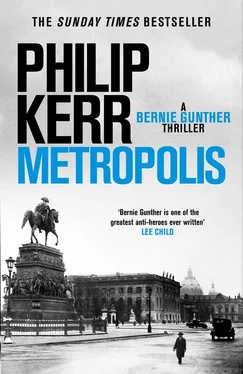As it happened, Magnus Heimannsberg knew a lot more about risk than he did about prostitutes, at least the female ones. According to Gennat, he lived with a handsome police major called Walther Encke, in an apartment on Apostel-Paulus-Strasse, in Berlin Schöneberg. Which probably also explained why he was not one of the Republic’s great police reformers. But he was very popular with the common patrolmen by virtue of the fact he’d started his career at the bottom of the ladder and also was totally apolitical, which is to say he was a staunch republican, like me. Neither a communist nor a Nazi, he was interested only in the welfare of the men whom he commanded and he suffered a lot of fools gladly in a way that Weiss would never have countenanced. There was no love lost between these two senior officers but they both agreed on the importance of avoiding any further national scandal, and of avenging the published insult to the Berlin police by capturing this Dr Gnadenschuss as soon as possible.
What other nations called the coup de grâce, we Germans called the Gnadenschuss : a single shot to the head that puts a badly injured man out of his misery. Except that the men to whom this dubious mercy was accorded on the streets of Berlin in broad daylight in 1928 had been severely injured more than a decade before. All these new murder victims were disabled war veterans, half-men on cripple-carts who for years had been begging for coins in front of the city’s S-Bahn stations. The victims were men who couldn’t run away. The first three were shot through the head at point-blank range with a .25-calibre pistol in less than a week; the small-calibre shot was barely heard above the noise of the trains in the station overhead. And in the case of two of the victims, it took several hours before anyone noticed they were dead, such was the commonplace status of these disabled veterans and the almost silent method by which they had been dispatched.
We case-reviewed these three killings in Gennat’s office: Weiss, Heller, Gennat, Otto Trettin and me, with Frau Künstler typing up the transcript of what was said. Trettin had just returned after a length of time at a local sanatorium, which meant we were at last back to full strength.
‘Take Otto through the facts as we know them, Bernie,’ said Weiss. ‘He can read the files later.’
‘The first victim was Werner Schlichter,’ I said. ‘Age thirty-six, with no family that we know of. Formerly a sergeant with the 180th Infantry. Took a bullet in the spine in 1916 at the Battle of the Somme, which left him paralyzed from the waist down. A Berliner, he’d been a gardener at the Botanical Garden in Dahlem before the war. More recently he lived in the Salvation Army hostel on Müllerstrasse. His body was found near the railway station at Wedding, just south of Nettelbeckplatz, on 6th June. He’d been shot once through the forehead in broad daylight at close range with a .25-calibre automatic. There was no used brass found at the scene, which means the killer felt confident enough to pick it up and take it away with him. The body was found by a schoolteacher from the Lessing Gymnasium on Pankstrasse — a Herr Kesten. A veteran himself, he’d spoken to Schlichter on previous occasions, when he put a few coins in the man’s cap. Except that on this occasion, the cap was on the dead man’s head, covering the bullet wound, instead of lying on his thigh, where it could more usefully collect coins. Again, it’s assumed that it was the killer who put the man’s cap on his head. Still on Schlichter’s army tunic were the Honour Cross with Swords and a German Imperial Wound Badge, black grade, and in his pockets were several marks. The Salvation Army commander at the hostel is a man called Harfensteller, also an army veteran, who said that Schlichter kept to himself and had no particular friends or enemies that he could think of. Before going on the streets to beg he had worked at the Oskar-Helene Home here in Berlin but apparently he didn’t care for the regime there and left.’
‘Nobody saw anything?’ asked Trettin.
‘Not a thing,’ I said, and handed Trettin the photograph taken by Hans Gross. From the picture it was easy to see why the murder had gone unnoticed for several hours; Schlichter was seated on his klutz cart and looked to all the world as if he was asleep; the entry wound resembled nothing more than a small carbuncle on his forehead.
‘Why didn’t he like the Oskar-Helene?’ asked Trettin.
‘I’ll come back to that in a minute.’
Otto Trettin was a good detective but, like Kurt Reichenbach, he was at times a little bit heavy-handed; he’d once been attacked by two thugs from a criminal ring called Apache Blood and had put both men in hospital, with one losing an eye. He was not a man to tangle with. He’d also been rapped over the knuckles by Gennat for fiddling his expenses. He was said to be working with another detective on a book about famous Berlin murder cases. A moneymaker, perhaps; all of us were interested in making a little extra money, of course. Even Bernhard Weiss had recently published a book, Police and Politics . Somewhat dull, it didn’t have much appeal to the general public and it was bruited that one or two Berlin coppers hadn’t liked what he had to say about them in print. Gennat was also rumoured to be working on a book. Sometimes I thought I was the only detective in the Commission who wasn’t planning a separate career as a writer.
‘Thirty-six hours later,’ I said, ‘we found the second victim: Oskar Heyde, age forty. The body was underneath the Friedrichstrasse station bridge. He’d been shot twice through the head at close range. Originally a businessman from Silesia, he joined the Fiftieth Reserve Division as an infantry lieutenant and was badly injured at the Third Battle of Ypres in September 1917, when he was blown up by a British mine, which cost him both legs and the sight in his left eye. For which he was awarded the Iron Cross. After the war he went to live with his brother Gustav in Potsdam, but the brother lost everything in the inflation and killed himself. Heyde then went to the Oskar-Helene Home, but he didn’t care for the regime either, and left soon afterwards, since when he was on the street. Again, the body was undisturbed for several hours before anyone noticed anything suspicious.’
‘So what is it with the Oskar-Helene?’ asked Trettin.
I looked at Weiss. ‘Boss? Perhaps you’d like to take that question.’
Weiss removed his pince-nez, relit his cigar and leaned back in his chair. ‘Gunther and I visited the home, which is in Berlin-Zehlendorf, the day before yesterday,’ he said. ‘It was most informative. And utterly depressing. Quite the most depressing experience I’ve had in a long time. It’s my opinion that those who run it represent everything that’s wrong with modern Germany. The place is under the control of two doctors, Konrad Biesalski and Hans Wurtz, who have very definite, not to say inflexible, ideas on rehabilitation and social integration. They believe hard work is the only true cure for an injured man’s maladies; that a man who remains work-shy and dependent on society demonstrates “a crippled soul” and is constitutionally deficient to the extent of being degenerate. Frankly, they leave nothing for a man’s pride, even half a man, with half a face, as was the case with several of the men we encountered.
‘I don’t doubt that their intentions are good. But it seems to me that not every man who was badly injured is capable of work. If you submit to their regime and become a morally healthy, curable cripple, then you agree to be retrained and to become a useful member of society, or at least society as it is perceived by these two doctors. If you don’t, you find yourself classed as a feeble-minded, morally unhealthy, incurable invalid; more important, you put yourself beyond any financial compensation for war-related suffering.’
Читать дальше












